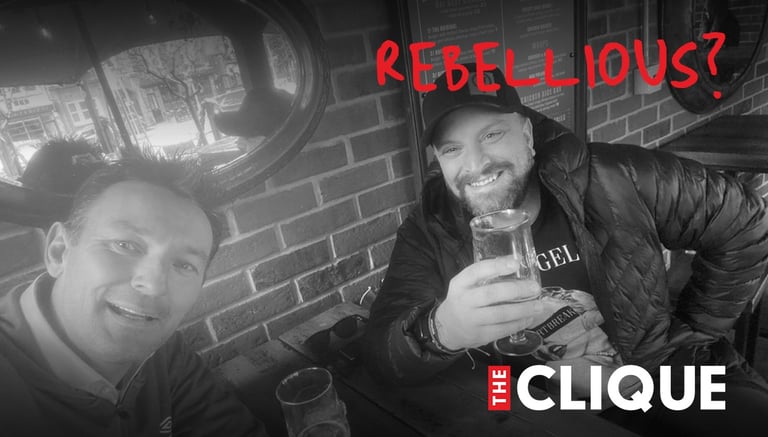Rebellion is a choice.


// Being a rebel.
Rebellion is often seen as a reaction against society and against the normal rules of life, but is it truly a choice?
I think there are two trains of thought - the conscious decision to be rebellious and then there is the unconscious lifestyle choice - I think I sit in the latter as I’ve never liked conforming to norms.
One memory that surfaced this week because of the exam results wave that passed through the country was my experiences with exams and most importantly, GCSE’s. You see, when I was just starting my GCSE’s, I moved to London and had to drop several subjects because the school I moved to didn’t do them (thankfully I had to drop French and we all know how much I don’t like French) but I picked up subjects like media studies and weirdly, latin.
Unfortunately, I never got to sit those subjects (oh how I wish I had) as I had to move back to my hometown of Gosport around a year before the GCSE’s were about to be taken and thanks to the wonderful joined up education system, I had to pick up the subjects I had dropped a few years earlier. In my teenage brain, I must’ve thought ‘f*ck it’ because I then didn’t really try in my exams.
I didn’t even attempt French (because who really cares) and for my (double) science exam, I didn’t bother turning up with a calculator because I obviously knew all the answers and I didn’t really have the appetite to ask for one after being shafted out of the exams I actually wanted to take.
In a strange twist of fate, I failed both those exams - French and Science were complete washouts.
The only thing I got an A* in was English Speaking because I was the one who always wanted to stand up and do the reading of extracts, I was the one who was happy to stand at the front of the class and I was the one who was happy to present anything (still true to this day).
// The results.
I think that set the tone for the rebellion against the system - I wasn't helped in my education system as I moved schools in the most inconvenient of ways and I just don’t think the system was set up for someone like me. With the ‘computer says no’ attitude of the school exam system, I was set up to not conform against whatever people told me.
I had a brief period in my late teens/early 20’s where I pushed back against society a little too hard - I was in the Army and all the rules and regulations pushed me into a place of complete defiance and I’ll admit, I broke way too many rules and got punished accordingly but my life was in a place where I was being controlled and I don’t perform well with strict regulations.
I heard a phrase the other day ‘freedom is the ultimate wealth’ and I have to agree - when you have freedom to do what you want, you’re in a priviliged place. (When I say ‘do what you want’ - I obviously have caveats to that).
This realization - that freedom is the ultimate wealth - has shaped how I approach life and work. My rebellious nature isn't just about rejecting rules for the sake of it, it's about carving out a life that aligns with my values, where I have the autonomy and privilege to choose my own path.
Whether it's in my career, where, despite being in conventional ‘safe’ roles, I've chosen unconventional ways to express my creativity, or in my personal life, where I prioritize experiences and having fun over societal expectations, rebellion has become a tool for preserving my sense of self.
But rebellion isn’t without its costs, pushing back too hard results in real consequences (as I’ve found out). But despite any consequences or fears about actually fitting in, I am certain that I am not built for conformity.
// Work
In work, I like to think of myself as a ‘problem solver’ - I like to resolve things and make changes to streamline, speed up and better the overall company or strategy.
I think that being rebellious has helped me do this - When you rebel against the usual way of doing things, it often leads to new and creative ideas.
When you don’t follow the same path as everyone else, you open yourself up to discovering unique solutions and innovative approaches to problems. This kind of thinking helps you stand out and can lead to breakthroughs that others might not have thought possible - it might seem like magic to others or experience above your years but it’s actually just a conditioned way of thinking.
The ‘normal’ phrase I think is ‘thinking outside the box’ but actually, it’s just thinking of the most logical things and expressing them in a way which makes sense.
When you’re constantly thinking outside of the normal routes and constantly discovering the ways you could do things ‘differently’ - actually, the most mundane and normal ways of doing things are easy to see.
// Content
When it comes to content creation, my rebellious streak goes up a notch.
I’ve always believed that true creativity comes from breaking away from the norm and exploring uncharted territories - doing things that pique interest and capture attention. I don’t think I’ve ever just followed a trend - I’ve always been the one questioning them, pushing boundaries, and sometimes even going against what’s popular.
My content isn’t about ticking boxes or fitting into neat categories. This blog for example, it’s about expressing raw, authentic ideas that resonate on a deeper level - I’ve steered away from the formulaic educational content and tried to make everything relatable.
Whether I’m writing, speaking, or creating visuals, I aim to challenge conventional wisdom and offer fresh perspectives. This approach might not always align with mainstream expectations, but that’s precisely why it stands out and it’s why I think I’m fairly good at creating work which nabs attention.
But how? How can you create something which is ‘rebellious’ and doesn’t blend in?
Rebellion in content means refusing to be a carbon copy of what’s already out there - whilst I’ve copied things, reworked posts and in some instances stolen design ideas, I like to recombine these things in a way which is unique.
I once presented a podcast with Paul Tansey (linked here) and one phrase that really stood out for me was ‘much innovation is actually just recombination’ - It’s about taking risks, experimenting with new formats, and being unafraid to voice opinions that might be controversial.
For me, this isn’t just a strategy which is thought out or is a conscious choice, it’s a reflection of who I am. When I create, my content is an extension of my desire to question the status quo and inspire others to do the same.
// End
Rebellion has always been my way of staying true to myself - whether in life, work, or creativity.
It’s not just about breaking rules for the sake of it, it’s about forging a path that feels authentic, even when it’s not the easiest and I’m pretty sure that it’s the harder path to choose!
I understand that it comes with its challenges, but this spirit of defiance is what keeps me pushing boundaries and striving for more - I’m always looking for the next thing I can do and if there’s one thing I’ve learned, it’s that the courage to be different is what leads to real innovation and fulfillment.
So, why fit in when you can stand out?


